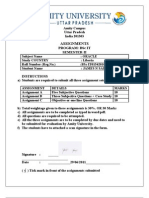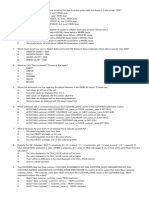SQL_MCQ_Beginners
Uploaded by
shivani.6947sSQL_MCQ_Beginners
Uploaded by
shivani.6947sSQL Multiple-Choice Questions for Beginners
1. Which of the following commands is used to retrieve all records from a
table?
a) SELECT * FROM table_name; b) UPDATE table_name; c) DELETE FROM
table_name; d) INSERT INTO table_name;
2. What is the correct syntax to filter records where the "salary" is greater than
5000?
a) SELECT * FROM employees WHERE salary = 5000; b) SELECT * FROM
employees FILTER salary > 5000;
c) SELECT * FROM employees WHERE salary > 5000; d) SELECT * FROM
employees ORDER BY salary > 5000;
3. Which keyword is used to sort data in descending order?
a) SORT DESCENDING b) ORDER DESCENDING c) DESC ORDER d) ORDER
BY DESC
4. How do you change the value of the "email" column in the "users" table for a
specific user?
a) ALTER TABLE users SET email; b) MODIFY email IN users;
c) UPDATE users SET email = 'newemail@example.com' WHERE user_id = 1;
d) CHANGE users email 'newemail@example.com';
5. Which clause is used to filter data in SQL?
a) ORDER BY b) FILTER c) WHERE d) GROUP BY
6. What does the following query do?
`UPDATE products SET price = price * 1.10 WHERE category = 'electronics';`
a) Deletes all products in the electronics category b) Increases the price of
electronics by 10%
c) Filters out electronics products d) Displays electronics products without
price changes
7. How do you select employees whose names start with the letter 'A'?
a) SELECT * FROM employees WHERE name = 'A%'; b) SELECT * FROM
employees WHERE name LIKE 'A%';
c) SELECT * FROM employees WHERE name IN 'A'; d) SELECT * FROM
employees ORDER BY name 'A%';
8. How do you order data by "salary" in ascending order?
a) ORDER BY salary DESC; b) ORDER BY salary ASC; c) SORT BY salary; d)
GROUP BY salary ASC;
9. Which SQL statement is used to update data in a table?
a) MODIFY b) CHANGE c) UPDATE d) ALTER
10. How do you retrieve unique values from a column in SQL?
a) SELECT UNIQUE column_name FROM table_name; b) SELECT DISTINCT
column_name FROM table_name;
c) SELECT DIFFERENT column_name FROM table_name; d) SELECT VARIED
column_name FROM table_name;
11. What will the following SQL query do?
`DELETE FROM employees WHERE department = 'Sales';`
a) Adds new employees to the Sales department b) Removes all employees
from the Sales department
c) Displays employees in the Sales department d) Modifies employee details in
the Sales department
12. Which of the following correctly filters records for ages between 18 and 25?
a) WHERE age BETWEEN 18, 25 b) WHERE age >= 18 AND age <= 25
c) WHERE age BETWEEN 18 TO 25 d) WHERE age IN RANGE (18, 25)
13. Which clause groups records with the same values in specified columns?
a) ORDER BY b) GROUP BY c) SORT BY d) FILTER BY
14. What does this SQL command do?
`SELECT * FROM students WHERE grade > 80 ORDER BY grade DESC;`
a) Deletes students with grades over 80 b) Filters students with grades over 80
and sorts them in descending order
c) Updates grades of students d) Filters students with grades below 80
15. How do you update the "status" column to "active" for users aged over 30?
a) ALTER TABLE users SET status = 'active';
b) UPDATE users SET status = 'active' WHERE age > 30;
c) CHANGE TABLE users status TO 'active';
d) MODIFY users SET status 'active' FOR age > 30;
16. What does the following SQL query do?
`SELECT name, salary FROM employees WHERE department = 'HR' ORDER BY
salary ASC;`
a) Updates the salary of HR employees b) Deletes HR employees with low
salaries
c) Selects names and salaries of HR employees, sorted by salary in ascending
order
d) Filters out HR department employees without sorting
17. How do you sort a result set by multiple columns?
a) ORDER BY column1, column2 b) SORT column1 AND column2
c) GROUP BY column1, column2 d) FILTER BY column1, column2
18. What does the following query do?
`SELECT COUNT(*) FROM orders WHERE status = 'Shipped';`
a) Counts total orders in the table b) Counts orders with a status of "Shipped"
c) Displays all shipped orders d) Deletes shipped orders from the table
19. How do you select records where "city" is either 'Delhi' or 'Mumbai'?
a) WHERE city = 'Delhi' AND city = 'Mumbai'
b) WHERE city IN ('Delhi', 'Mumbai')
c) WHERE city BETWEEN 'Delhi' AND 'Mumbai'
d) WHERE city LIKE 'Delhi' OR 'Mumbai'
20. What does this query do?
`SELECT name, MAX(salary) FROM employees;`
a) Selects all employee names and their salaries
b) Selects the employee with the highest salary
c) Selects the highest salary and all employee names
d) Selects names of employees without considering salary
You might also like
- 345 - SQL Database Fundamentals - R - 2018100% (1)345 - SQL Database Fundamentals - R - 201810 pages
- Class 12 IT Database Concepts 5 years Question BankNo ratings yetClass 12 IT Database Concepts 5 years Question Bank16 pages
- Oracle Mockup Exam CHN09JM001 - Pattern 1No ratings yetOracle Mockup Exam CHN09JM001 - Pattern 16 pages
- CC6001ES ADSD SQL Exam Model Paper 1 AnswersNo ratings yetCC6001ES ADSD SQL Exam Model Paper 1 Answers12 pages
- Exam: NR0-013 Title: Teradata SQL v2r5 Ver: 03-03-08100% (1)Exam: NR0-013 Title: Teradata SQL v2r5 Ver: 03-03-0837 pages
- Oracle 1Z0-051 - Estudo Dirigido: Name Null TypeNo ratings yetOracle 1Z0-051 - Estudo Dirigido: Name Null Type21 pages
- Cassandra Query Language by Examples - Puzzles with AnswersFrom EverandCassandra Query Language by Examples - Puzzles with AnswersNo ratings yet
- AP Computer Science Principles: Student-Crafted Practice Tests For ExcellenceFrom EverandAP Computer Science Principles: Student-Crafted Practice Tests For ExcellenceNo ratings yet
- Data Handling using Pandas - Revision NotesNo ratings yetData Handling using Pandas - Revision Notes6 pages
- Skill 4.8 Creating A Report Using The Report WizardNo ratings yetSkill 4.8 Creating A Report Using The Report Wizard6 pages
- 2JdR4PdZSEGXUeD3WWhBYg - Course 7 Week 5 Glossary - DA Terms and DefinitionsNo ratings yet2JdR4PdZSEGXUeD3WWhBYg - Course 7 Week 5 Glossary - DA Terms and Definitions24 pages
- Please Read This File Before Downloading ECC6 - EHP7&WIN64Bit&Sql2008 Installation Notes - ZH-CN - enNo ratings yetPlease Read This File Before Downloading ECC6 - EHP7&WIN64Bit&Sql2008 Installation Notes - ZH-CN - en4 pages
- 1 Oracle Database Administration: OverviewNo ratings yet1 Oracle Database Administration: Overview5 pages
- Beginning Zend Framework: Or: How I Learned To Stop Worrying and Love The Framework. Part 1: Setting UpNo ratings yetBeginning Zend Framework: Or: How I Learned To Stop Worrying and Love The Framework. Part 1: Setting Up41 pages
- Blood Bank Management System (Python&MySQL)No ratings yetBlood Bank Management System (Python&MySQL)16 pages
- Expertise Through Exercise: New Tournament Quiz Format Coming in 2021No ratings yetExpertise Through Exercise: New Tournament Quiz Format Coming in 20213 pages
- Class 12 IT Database Concepts 5 years Question BankClass 12 IT Database Concepts 5 years Question Bank
- Exam: NR0-013 Title: Teradata SQL v2r5 Ver: 03-03-08Exam: NR0-013 Title: Teradata SQL v2r5 Ver: 03-03-08
- Cassandra Query Language by Examples - Puzzles with AnswersFrom EverandCassandra Query Language by Examples - Puzzles with Answers
- SQL Server Functions and tutorials 50 examplesFrom EverandSQL Server Functions and tutorials 50 examples
- AP Computer Science Principles: Student-Crafted Practice Tests For ExcellenceFrom EverandAP Computer Science Principles: Student-Crafted Practice Tests For Excellence
- Skill 4.8 Creating A Report Using The Report WizardSkill 4.8 Creating A Report Using The Report Wizard
- 2JdR4PdZSEGXUeD3WWhBYg - Course 7 Week 5 Glossary - DA Terms and Definitions2JdR4PdZSEGXUeD3WWhBYg - Course 7 Week 5 Glossary - DA Terms and Definitions
- Please Read This File Before Downloading ECC6 - EHP7&WIN64Bit&Sql2008 Installation Notes - ZH-CN - enPlease Read This File Before Downloading ECC6 - EHP7&WIN64Bit&Sql2008 Installation Notes - ZH-CN - en
- Beginning Zend Framework: Or: How I Learned To Stop Worrying and Love The Framework. Part 1: Setting UpBeginning Zend Framework: Or: How I Learned To Stop Worrying and Love The Framework. Part 1: Setting Up
- Expertise Through Exercise: New Tournament Quiz Format Coming in 2021Expertise Through Exercise: New Tournament Quiz Format Coming in 2021

























































































